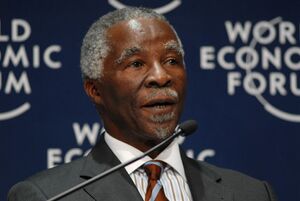Thabo Mbeki
( politician) | |||||||||||||||||||||||||||||||||||||||||||
|---|---|---|---|---|---|---|---|---|---|---|---|---|---|---|---|---|---|---|---|---|---|---|---|---|---|---|---|---|---|---|---|---|---|---|---|---|---|---|---|---|---|---|---|
 | |||||||||||||||||||||||||||||||||||||||||||
| Born | 25 June 1942 Mbewuleni, Eastern Cape, South Africa | ||||||||||||||||||||||||||||||||||||||||||
| Nationality | South African | ||||||||||||||||||||||||||||||||||||||||||
| Alma mater | • University of London • University of Sussex | ||||||||||||||||||||||||||||||||||||||||||
| Parents | • Govan Mbeki • Epainette Mbeki | ||||||||||||||||||||||||||||||||||||||||||
| Children | Monwabise Kwanda | ||||||||||||||||||||||||||||||||||||||||||
| Spouse | Zanele Dlamini Mbeki | ||||||||||||||||||||||||||||||||||||||||||
| Member of | Club de Madrid | ||||||||||||||||||||||||||||||||||||||||||
| Party | African National Congress | ||||||||||||||||||||||||||||||||||||||||||
President of South Africa replaced in 2008 after dissent about AIDS
| |||||||||||||||||||||||||||||||||||||||||||
Thabo Mvuyelwa Mbeki is a South African politician who was the second president of South Africa from 14 June 1999 to 24 September 2008, when he resigned at the request of his party, the African National Congress (ANC).[1] Before that, he was deputy president under Nelson Mandela between 1994 and 1999.
His refusal to bow to the official narrative on AIDS led to him being replaced by Jacob Zuma in 2008.
AIDS
AIDS has been a big thing in South Africa for decades. The pandemic was said to be spreading throughout the country and it got the media, government departments, private businesses and the education system swept up into a frenzy. Red ribbons were placed on every communication in South Africa, children had to be taught the benefits of safe sex practices and churches had opening and closing prayers to ask for a blessing from the Almighty for those that are suffering from the deadly disease. [2]
Mbeki was intensely attacked attempt to break with the official narrative on AIDS, where it is caused by the HIV virus, diagnosed with a PCR test, and needs to be treated with mass deployment in the population of toxic antiretroviral drugs like AZT.[2] South African Communist Party’s Youth League demanded that he be tried for genocide.[3] The African National Congress (ANC) replaced him with Jacob Zuma whose first act when he came into power was to distance himself from the country’s “era of denialism"[4]. Zuma started a massive rollout of antiretrovirals and, rare in the divisiveness of South African politics, he was temporarily praised by the leader of the opposition party Helen Zille.
The panel
In 2000, President Mbeki convened a panel to look at several key issues around this. While having many members with orthodox views on it, it also allowed scientists with other views to participate, including Claus Koehnlein, David Rasnick, Luc Montagnier, and even Peter Duesberg, the virologist who was frozen out of US academia by Anthony Fauci for his views that HIV did not cause AIDS.[5]
Among these issues were questions relating to the accuracy of the tests currently used to make the diagnosis of human immunodeficiency virus (HIV) infection; the impact of poverty and malnutrition on the ability of people to respond to this infection; and the relationship between HIV infection and many other infections which are common in Africa such as Tuberculosis (TB), malaria, hepatitis as well as other parasitic infections...Some of these views questioned the authenticity of the claim that an AIDS epidemic exists at all in South Africa."[5]
Mbeki also defended dissidents scientists:
“Not long ago, in our own country, people were killed, tortured, imprisoned and prohibited from being quoted in private and in public because the established authority believed that their views were dangerous and discredited. We are now being asked to do precisely the same thing that the racist apartheid tyranny we opposed did, because, it is said, there exists a scientific view that is supported by the majority, against which dissent is prohibited... People who otherwise would fight very hard to defend the critically important rights of freedom of thought and speech occupy, with regard to the HIV-AIDS issue, the frontline in the campaign of intellectual intimidation and terrorism...”
Thabo Mbeki [6]
Events Participated in
| Event | Start | End | Location(s) | Description |
|---|---|---|---|---|
| WEF/Annual Meeting/1998 | January 1998 | January 1998 | Switzerland WEF | At Davos, reforming the global financial system was the main concern in the Informal Gathering of World Economic Leaders |
| WEF/Annual Meeting/2000 | January 2000 | January 2000 | Switzerland WEF | At the Annual Meeting 2000, the Global Alliance for Vaccines and Immunization (GAVI) was born. |
| WEF/Annual Meeting/2005 | January 2005 | January 2005 | Switzerland WEF | |
| WEF/Annual Meeting/2007 | 24 January 2007 | 28 January 2007 | Switzerland WEF | Only the 450 public figures listed of ~2200 participants |
| WEF/Annual Meeting/2008 | 23 January 2008 | 27 January 2008 | Switzerland WEF | At the 2008 summit, Klaus Schwab called for a coordinated approach, where different 'stakeholders' collaborate across geographical, industrial, political and cultural boundaries." |
References
- ↑ https://web.archive.org/web/20070416053536/http://www.info.gov.za/leaders/president/index.htm
- ↑ Jump up to: a b https://www.biznews.com/health/2022/09/29/aids-covid
- ↑ https://www.politicsweb.co.za/news-and-analysis/mbeki-and-the-charge-of-genocide--frans-cronje
- ↑ https://www.nytimes.com/2009/12/02/world/africa/02safrica.html
- ↑ Jump up to: a b http://virusmyth.com/aids/hiv/panel/aidsreport.pdf
- ↑ https://www.pbs.org/wgbh/pages/frontline/aids/docs/mbeki.html